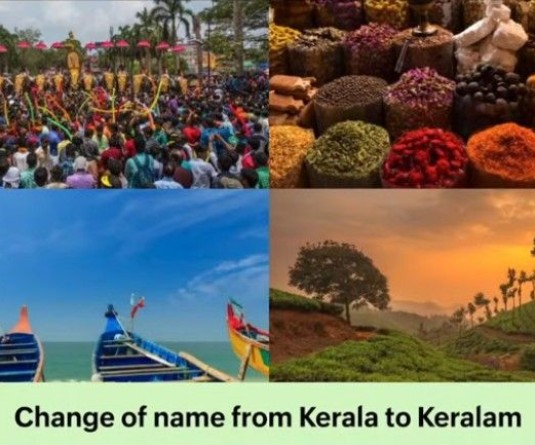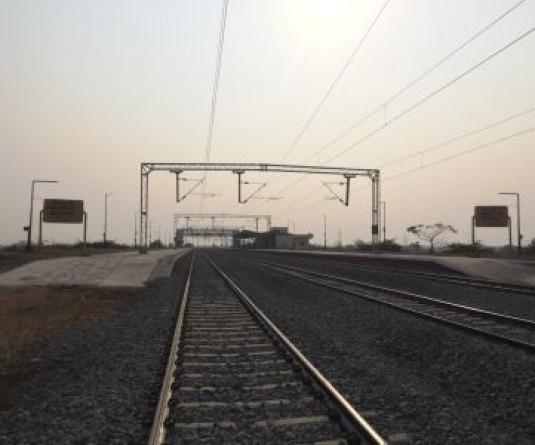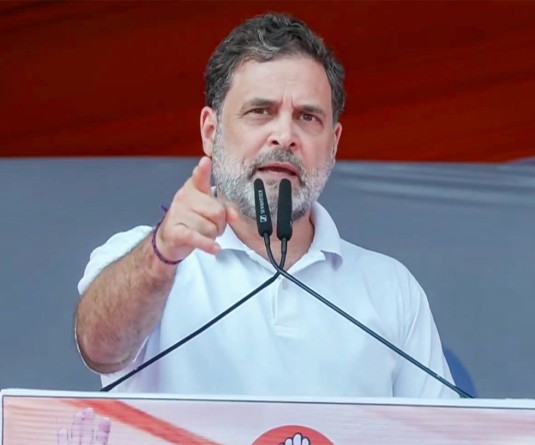
MUMBAI, January 17 (PTI) : After hearing arguments for three months, the Bombay High Court on Monday reserved till February 7 its order on the appeal filed by Pakistani terrorist Ajmal Kasab against the death sentence awarded to him for his role in the 26/11 Mumbai terror attacks. Justice Ranjana Desai and Justice R V More also reserved order on an appeal filed by the Maharashtra government challenging the acquittal of LeT suspects Faheem Ansari and Sabauddin Ahmed, who were charged with providing maps of targets to terrorists. The arguments concluded on Monday after which the judges reserved judgement.
Court room No. 49 on the second floor of the high court building, where the arguments were held from October 18, had turned into a fortress with tight security. Every day sniffer dogs came to look for suspicious objects. Journalists and lawyers were given identity cards and entry was strictly regulated. For the first time video conference link was put up in the high court for hearing appeals. Cameras were installed in the court to enable Kasab hear the proceedings from the jail. Kasab had appeared on the screen for a few days initially. On the second day of the hearing he had thrown a tantrum and picked up an argument with jail guards besides spitting at the web camera. He even told the court that he should be sent to America. The court rejected his plea and warned him to behave.
Government counsel Ujjwal Nikam justified the death sentence awarded to Kasab, saying he had committed heinous crime by participating in terror strikes in which 166 persons were killed. During the hearing, Nikam displayed photographs of Kasab and slain terrorist Abu Ismael, which showed them indulging in terror acts in and outside Chhatarapati Shivaji Railway Terminus (CST). The pictures had been clicked by two media photographers. He also showed the court the CCTV footages from cameras installed at CST, showing Kasab and Ismael moving about with rifles.
Nikam argued that the court had erred in partially accepting Kasab’s confession before a magistrate. It had to be accepted in toto and not partially; Kasab’s act of retracting his confession in the trial court was an “after-thought” and “well advised”, argued Nikam. At the behest of LeT, Kasab and others had come from Pakistan to attack Mumbai. They were told to take as many hostages as possible to demand creation of a separate state for Muslims and liberation of Kashmir, the government counsel said, adding this was clear from the telephonic talks the terrorists had with their Pakistani handlers.
Nikam said Kasab was captured at Girgaum chowpatty by police after an encounter in which he killed police officer Tukaram Ombale. However, Kasab alleged that police had staged a false encounter at Chowpatty to implicate him. Kasab also denied his presence at CST when the incident occurred. His lawyer Amin Solkar argued that CCTV footages did not show Kasab’s face clearly. He alleged that some footages were shown and others were “suppressed” by the prosecution to implicate Kasab. About the photographs of Kasab in terror acts, his lawyer argued that they were morphed. He said the trial was “unfair” and demanded retrial. He said some important witnesses had not been examined. However, the high court rejected his plea for a fresh trial.
Kasab also denied that he had killed police officers Hemant Karkare, Vijay Salaskar and Ashok Kamate. His lawyer Amin Solkar referred to the trial court’s observation which said that bullets recovered from bodies of Karkare and Salaskar did not match with Kasab’s rifle although bullets in Kamate’s body tallied with Ismael’s weapon. Kasab’s lawyer said Karkare was in constant touch on telephone with the control room and demanded that records of wireless phone should be called for.
Solkar wondered why Karkare and other officers had taken a longer route to Cama Hospital when they were in close vicinity and asked why did they proceed in the direction where terrorists were hiding despite being warned by the control room. Kasab denied that he had come from Pakistan along with other terrorists in a dinghy. He said he had come by Samjhauta Express to Delhi and later went to Mumbai to see Hindi films. He was arrested at Juhu beach and was in police custody when the terror attacks took place.
Nikam countered this by saying that Kasab was a liar and plotter who invented stories from time to time during the trial. However, when Kasab came up with a new story he got trapped in his own web of lies. About Faheem and Sabauddin, both Indian citizens, Nikam said that trial court had erred in acquitting them. Faheem had got a passport from Pakistan on the basis of fake documents.
Faheem, he said, had gone to Pakistan and at the behest of LeT he drew maps of targets and gave it to Sabauddin in Nepal. Sabauddin then passed them on to LeT. Nikam showed the passport to the court which had an entry of Faheem’s visit from Pakistan to Nepal. Nikam said Faheem had stayed under assumed name of Sahil Pawaskar in south Mumbai where the terror attacks took place. He also sought admission in a computer institute under the same name. Nikam referred to evidence of a witness who said he had seen Faheem giving map to Sabauddin in Nepal.
Faheem’s lawyer R B Mokashi denied his client’s role in the 26/11 attacks. He said holding forged Pakistani passport did not prove Faheem’s role in the attacks. He said the map found in slain terrorist Abu Ismael’s pocket (claimed by prosecution as drawn by Faheem) was “planted”.
Sabauddin’s lawyer Ejaz Naqvi said Sabauddin had not met Faheem in Nepal. The prosecution had produced only one witness to prove that Faheem gave map to Sabauddin but did not provide any corroborative evidence, he argued and said the trial court had rightly given the benefit of doubt to both the accused. On May 6, the trial court had given capital punishment to Kasab but acquitted Faheem and Sabauddin on the ground that evidence against them was doubtful.
Court room No. 49 on the second floor of the high court building, where the arguments were held from October 18, had turned into a fortress with tight security. Every day sniffer dogs came to look for suspicious objects. Journalists and lawyers were given identity cards and entry was strictly regulated. For the first time video conference link was put up in the high court for hearing appeals. Cameras were installed in the court to enable Kasab hear the proceedings from the jail. Kasab had appeared on the screen for a few days initially. On the second day of the hearing he had thrown a tantrum and picked up an argument with jail guards besides spitting at the web camera. He even told the court that he should be sent to America. The court rejected his plea and warned him to behave.
Government counsel Ujjwal Nikam justified the death sentence awarded to Kasab, saying he had committed heinous crime by participating in terror strikes in which 166 persons were killed. During the hearing, Nikam displayed photographs of Kasab and slain terrorist Abu Ismael, which showed them indulging in terror acts in and outside Chhatarapati Shivaji Railway Terminus (CST). The pictures had been clicked by two media photographers. He also showed the court the CCTV footages from cameras installed at CST, showing Kasab and Ismael moving about with rifles.
Nikam argued that the court had erred in partially accepting Kasab’s confession before a magistrate. It had to be accepted in toto and not partially; Kasab’s act of retracting his confession in the trial court was an “after-thought” and “well advised”, argued Nikam. At the behest of LeT, Kasab and others had come from Pakistan to attack Mumbai. They were told to take as many hostages as possible to demand creation of a separate state for Muslims and liberation of Kashmir, the government counsel said, adding this was clear from the telephonic talks the terrorists had with their Pakistani handlers.
Nikam said Kasab was captured at Girgaum chowpatty by police after an encounter in which he killed police officer Tukaram Ombale. However, Kasab alleged that police had staged a false encounter at Chowpatty to implicate him. Kasab also denied his presence at CST when the incident occurred. His lawyer Amin Solkar argued that CCTV footages did not show Kasab’s face clearly. He alleged that some footages were shown and others were “suppressed” by the prosecution to implicate Kasab. About the photographs of Kasab in terror acts, his lawyer argued that they were morphed. He said the trial was “unfair” and demanded retrial. He said some important witnesses had not been examined. However, the high court rejected his plea for a fresh trial.
Kasab also denied that he had killed police officers Hemant Karkare, Vijay Salaskar and Ashok Kamate. His lawyer Amin Solkar referred to the trial court’s observation which said that bullets recovered from bodies of Karkare and Salaskar did not match with Kasab’s rifle although bullets in Kamate’s body tallied with Ismael’s weapon. Kasab’s lawyer said Karkare was in constant touch on telephone with the control room and demanded that records of wireless phone should be called for.
Solkar wondered why Karkare and other officers had taken a longer route to Cama Hospital when they were in close vicinity and asked why did they proceed in the direction where terrorists were hiding despite being warned by the control room. Kasab denied that he had come from Pakistan along with other terrorists in a dinghy. He said he had come by Samjhauta Express to Delhi and later went to Mumbai to see Hindi films. He was arrested at Juhu beach and was in police custody when the terror attacks took place.
Nikam countered this by saying that Kasab was a liar and plotter who invented stories from time to time during the trial. However, when Kasab came up with a new story he got trapped in his own web of lies. About Faheem and Sabauddin, both Indian citizens, Nikam said that trial court had erred in acquitting them. Faheem had got a passport from Pakistan on the basis of fake documents.
Faheem, he said, had gone to Pakistan and at the behest of LeT he drew maps of targets and gave it to Sabauddin in Nepal. Sabauddin then passed them on to LeT. Nikam showed the passport to the court which had an entry of Faheem’s visit from Pakistan to Nepal. Nikam said Faheem had stayed under assumed name of Sahil Pawaskar in south Mumbai where the terror attacks took place. He also sought admission in a computer institute under the same name. Nikam referred to evidence of a witness who said he had seen Faheem giving map to Sabauddin in Nepal.
Faheem’s lawyer R B Mokashi denied his client’s role in the 26/11 attacks. He said holding forged Pakistani passport did not prove Faheem’s role in the attacks. He said the map found in slain terrorist Abu Ismael’s pocket (claimed by prosecution as drawn by Faheem) was “planted”.
Sabauddin’s lawyer Ejaz Naqvi said Sabauddin had not met Faheem in Nepal. The prosecution had produced only one witness to prove that Faheem gave map to Sabauddin but did not provide any corroborative evidence, he argued and said the trial court had rightly given the benefit of doubt to both the accused. On May 6, the trial court had given capital punishment to Kasab but acquitted Faheem and Sabauddin on the ground that evidence against them was doubtful.






